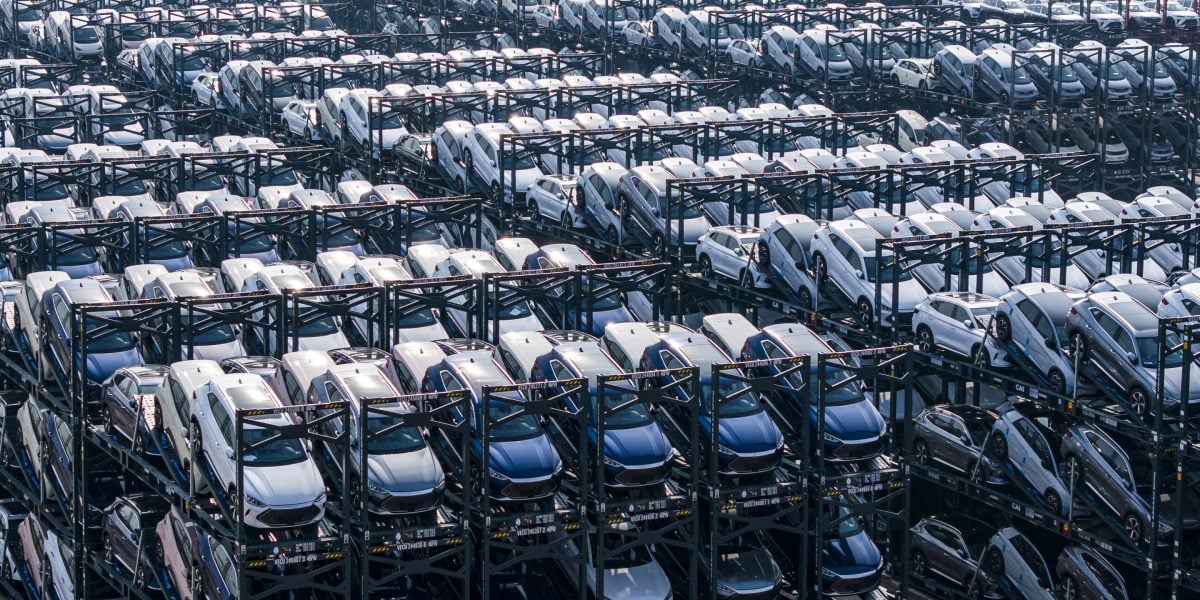China has become a powerhouse in electric vehicles. Its automaker BYD recently topped Tesla in global EV sales, with Elon Musk warning of Chinese carmakers, “If there are no trade barriers established, they will pretty much demolish most other car companies in the world. They’re extremely good.”
On Friday, the Alliance for American Manufacturing sounded the alarm, issuing a report entitled: “On a Collision Course: China’s Existential Threat to America’s Auto Industry and its Route Through Mexico.”
The report, which lists policy recommendations to combat overcapacity and unfair trade practices, notes that BYD is building factories in Thailand and Hungary designed to be regional export hubs. It then adds:
“More alarming, however, are Chinese firms’ heavy spending on plants in Mexico, through which they can access the United States by way of the more favorable tariffs under the United States-Mexico-Canada Agreement (USMCA). This strategy is, in effect, an effort to gain backdoor access to American consumers by circumventing existing policies that are keeping China’s autos out of the U.S. market.”
I keep seeing articles about how US car companies and car rental corps are backing off from EVs due to lack of demand.
So, which is it? Worried there might actually be demand if there are reasonably priced alternatives?
There is not enough demand for $120k EVs, theres plenty of demand for reasonable priced ones
It’s been obvious for at least ten years now that the Chinese are going to use the transition to EVs to try and take a big bite out of the automotive world market. But western manufacturers just sat on their hands. Now that it’s actually happening the only answer they have is cry for protectionism.
So basically the way Japan took prominence in the auto industry after the 1970s oil shocks?
Or how the Koreans moved from also-rans in CRTs to the forefront of the flat-panel display market?
Or how GM consumed the century-old locomotive industry during the rise of diesel?
A seismic change in an industry always invites new competitors. There’s no room for Surprised Pikachu faces here.
The more interesting question: is this a classic Innovator’s Dilemma: they don’t want to compete with BYD on a $16k EV for a global market when they can still sell $40k petrol SUVs to a diminishing slice of the first world? Or is it an admission their processes and designs are so ossified that they can’t compete?
Don’t pull the cheap-labour card. If there’s more than a $1000-per-car difference in price to build a car in a modern automated factory in China vs Mexico, then something is very wrong with your process.
My opinion is that the US and European incumbents are basically in the grip of the financial industry. All that counts are short term returns. Technically, they’d be up to the challenge but that would mean reduced margins in the short to medium term which is why it’s not happening.
And that’s how they sealed their own fate. And they should face the consequences imo.
The problem is, the rest of the world are the ones who will end up suffering. The company runners mostly take their golden parachutes and peace out to a board position on one of the surviving companies while they sit on the beach near their thirteenth house.
They won’t see any real consequences.
U mean, our fate
It isn’t a true Innovators dilemma because the petrol cars they make don’t require any further innovation.
All the innovation can happen in the EV drive train, any other innovations can apply equally to both ICE and EV models.
You’re right the innovation is also on the production line.
The fact is China is investing in technology and innovation has halted or been misapplied elsewhere.
Look at Motorsport. Formula E is dominated by Stelantis but a European and American conglomerate. F1 by Europe and Japan. New technology in endurance racing by Europe and Japan.
The US has one high quality player in the EV power train world and that is because they joined with other companies.
The US has fallen into the middle ground of not being high quality, and not being cheap.
The US auto sector has globally fallen towards the missing middle. They can escape by going in either direction. Or European and Japanese makers will take the premium market while China takes the basic volume consumer market.
If US automakers are so expensive that they cannot compete, they cannot compete. As simple as that.
Chinese workers make like $900 USD a month. It’s why everything they make is cheaper to make. All the parts that they manufacture that would be assembled in Mexico are made by people making $600 a month, and now the assemblers in Mexico will be getting around $800 a month.
I don’t think we should even be allowing imports of vehicles through Mexico from companies that aren’t Mexican. Same for anywhere else (including US assembling vehiclesin Mexico and sending them to US for sale). Then I also think the tarrifs should offset all the labor costs from parts, manufacturing, and assembly, minus true cost to have vehicles shipped.
The US labor force shouldn’t get left to the dust because we need more than $800 a month to have a fair wage. Imports need balanced out to totally offset costs so anyone making a vehicle doesn’t have to go the cheapest labor route/country to win. Keep the competition fair so people in the US can keep jobs.
You know…if we taxed a few folks to stave off the world’s first trillionaires, we could maybe afford something like UBI, and it’d be easier to compete.
Or, we could use the ever-increasing profit margins we see every quarter to invest in workers instead of investing in investing so we could pay a decent wage without making a car cost as much as a house should.
We won’t do either. Instead, we’ll start another trade war and make a surprised Pikachu face when that makes everything yet more expensive.
I’m fine with a trade war, as things are entire industries in the US have been disappearing because it’s cheaper to have China make it and ship it here because of labor costs and our tax system sucks.
Ok…but a trade war doesn’t fix either of those things. That’s not my opinion. Trump tried the trade war route with China. We didn’t start building more here; we switched to more expensive imports. I agree about the tax system generally, but I don’t see how it relates to a trade war.
Of course we didn’t start building stuff here with what trump did. Everyone knew it would be temporary. Odds are it would be over quicker than you could build a facility. Let alone make a profit back on it.
You want something real to stick in a trade war, you’d have to make it last at least 20 and not possible to have undone.
But but but … Elon, the Free Market ! You can’t ask for regulation, that immoral. You, the champion of Freedom, how sad this is …
There’s a saying that a business can’t disrupt itself. Legacy automakers are stuck in a cycle of continuing to improve their existing untouchable business lines and everything internally is oriented towards seeing continuous improvement without huge risk.
At some point customers are starting to think… I just need to get in my car and go somewhere. Does that really need to cost $58,000 base?
If some executive at Ford said hey let’s make a car that costs $12,000 he’d be tossed out the boardroom window. Ford doesn’t make money off cars like that.
As a newcomer BYD has a lot less to lose, so is better positioned to disrupt the whole industry. They don’t have incumbent lines of product to defend. So they can show up with alien technology or price points that just wouldn’t be interesting to a legacy.
I’m sure the people who work at BYD think of themselves as high tech innovators and wouldn’t even want to go work for a legacy given the choice.
It may or may not work… We’ll see. It’s certainly starting to look like Tesla is falling behind.
How is that an extinction level threat when Ford and GM build their stuff in Mexico too?
Because they’ve gotten complacent, similar to when Japan ate their lunch before.
Uh… maybe get Tesla to improve their product? Y’know like in the spirit of competition and all that?
Competition isn’t how we do things in America anymore. You either buy them outright or you get the government to prop you up until you’re too big to fail.
deleted by creator
If it’s in fortune or business insider it’s only purpose is to influence stock prices, not tell the truth about a business.
Pretty much. Anyone that has been following EV knows this is not news. Still nice to articles talking about it for the people who are not up to speed.
BI does have some good articles.
Fuck the US car industry and fuck Tesla.
Just to be fair: Fuck China, too.
This the same auto trade that had EVs thirty years ago?
It is? Weird.
They had em 100 years ago as well.
The main problem is that china highly regulates their market – which is the biggest world wide – while expecting everyone else to follow open markets.
I don’t get why these trade agreements allow for this. They should only apply to products form companies 100% owned by a member country of the agreement and must be things 100% sourced from the member countries.
Nothing is ever 100% sourced from one country. Whether it’s raw materials, sensors, computer silicon, batteries, or software, something is always going to be international.
thats fine to me. food and raw materials that are native as well as the odd things sourced from the three member countries.
How about actuators or tyres? Wire bundles, seats, steering wheels, insulation, shock absorbers, etc? Is it just the frame and body panels that need to be made there?
everything. if cars are not 100% from the 3 countries in the treaty then it should not have the discounted taxes.
Then it’s not gonna have that discount. No amount of subsidies is worth standing up a silicon foundry.
Edit: the point is, what’s the cutoff between the first and second set of things? Maybe ranked by capital investment required?
yes. thats the point. we would not have such a wide area of discount. Only whats truly local.
So how do you encourage cars to be made locally if you don’t give any incentive till it’s prohibitively expensive?








